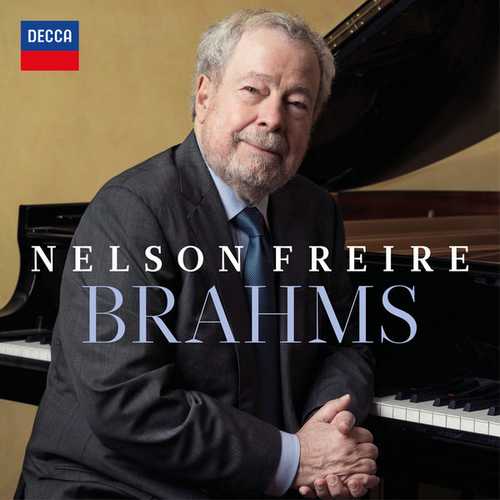

Composer: Johannes Brahms
Performer: Nelson Freire
Format: FLAC (tracks)
Label: Decca
Catalogue: 4832154
Release: 2017
Size: 1.14 GB
Recovery: +3%
Scan: yes
Piano Sonata No. 3 in F minor, Op. 5
01. 1. Allegro maestoso
02. 2. Andante espressivo
03. 3. Scherzo
04. 4. Intermezzo (Andante molto)
05. 5. Finale (Allegro moderato ma rubato)
Brahms: Klavierstücke, Op. 76
06. 3. Intermezzo in A Flat
07. 4. Intermezzo in B flat
Brahms: Fantasies (7 piano pieces), Op. 116
08. 1. Capriccio in D Minor
09. 4. Intermezzo in E Major
Brahms: Intermezzi, Op. 117
10. 2. Intermezzo in B Flat Minor
Brahms: Klavierstücke, Op. 118
11. 2. Intermezzo in A
12. 3. Ballade in G Minor
Brahms: Klavierstücke, Op. 119
13. 1. Intermezzo in B Minor
14. 2. Intermezzo in E Minor
15. 3. Intermezzo in C
16. 4. Rhapsody in E Flat
Brahms: Waltzes, Op. 39
17. 15. Waltz in A Flat
The title Brahms might seem an odd one for this collection of Brahms piano pieces, containing one piano sonata and an assortment of 12 short pieces, mostly from the end of the composer’s life. Yet the program does cover a good deal of Brahms’ keyboard thinking: piano compositions, except for variation sets, are sparse during his middle years. The Piano Sonata No. 3 in F minor, Op. 5, dates from 1853, when Brahms was 20: it is youthful music par excellence, with five movements and a shifting set of moods that pose interpretive challenges for the pianist. Freire has been playing the sonata since his teenage years, and he manages to make the music sound deliberate and inevitable despite its rather feverish intensity. With the exception of the final Waltz in A flat major, Op. 39, No. 15, Freire plays the rest of the music chronologically.
The listener has the sense of being drawn into a vortex of complexity as each work seems to explore new structural possibilities. You could sample almost anywhere, but try the uniquely flexible tonal implications of the first of the four Klavierstücke, Op. 119, a work that shows clearly why the “conservative” Brahms was so beloved by the 12-tone composers to come. The only possible way you might not like Freire’s deeply thought-out, precise performances of these is if you like your Brahms on the warmer side, but the dispassionate, investigative way Freire has it is probably the fastest way into these works that really take a lifetime to appreciate. A major Brahms release, with sympathetic engineering from Decca at the Friedrich-Ebert-Halle in Hamburg.



